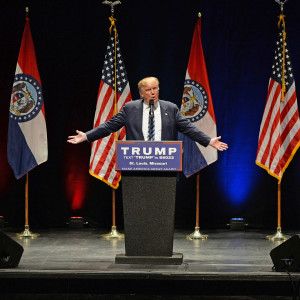Self-styled ‘white advocate’ Yale-grad Jared Taylor adores Donald Trump
Jared Taylor, the Yale-educated founder of American Renaissance, a group consistently under the Southern Poverty Law Center’s hate-watch, has recorded robocalls for Donald Trump, whom he calls “America’s great white hope.” Something of an elder statesman within the racist alt-right, Taylor thanks Trump for awakening a latent racist instinct. It’s this instinct—simply self-preservation, per Taylor—that will sweep the Donald into the highest office in the land come November, he says.
Taylor formed his group in 1990, having lived the first half of his life “an utterly conventional liberal.” Its flagship is an eponymous former print journal, current webzine dedicated to “racial realism.” He has a plummy mid-Atlantic voice, and throughout our hour-long conversation punctuates his sentences, “Well, gee!” He comes across as a crossbreed of George Plimpton, Beaver Cleaver and a standard-issue white supremacist.
Just don’t call him a white supremacist.
He celebrates Trump’s rejecting political correctness, what Taylor calls, “this enormously entrenched hostility to anyone who flouts the colored taboos.” But he shakes off labels offensive to his own delicate self-projection: “People call me all sorts of things,” most of them “incorrect and nasty.”
Taylor supports and encourages voluntary segregation, because racial intermingling “leads to the destruction of any kind of indigenous and authentic culture”—but he’s not a “white separatist.” He claims world history’s best achievements for white men, cites pseudoscientific data as definitive proof of racial superiority, and wants consciously preserved white majorities deciding the fate of societies built on white accomplishments—but a white supremacist? “I’m not sure what such a person would be. Presumably a supremacist wants to rule over other races.”
Instead, Taylor calls himself a “white advocate.” And he’s happy to find an ally for the advocacy in the Republican nominee Donald Trump: “He’s staked his presidency on building a wall, sending home illegals and certainly looking very seriously at Muslim immigration, and so he will get my vote.”
American Renaissance has never supported a party’s nominee before now. “This is the only candidate that I can think of for anything higher than dogcatcher I can imagine saying, ‘Well, what’s wrong with white’s being a majority?’” I reminded him of Pat Buchanan’s onetime candidacy. “That’s right! Well, gee, we did. We supported Pat Buchanan.” But no one, not even Buchanan, has ever come close to Trump.
Really though, Taylor doesn’t think Trump knows what he’s saying. By virtue of his innocence, or ignorance, of his own policies’ implications for the preservation of white-majority America, Trump’s policies reveal in him and awaken in others what Taylor calls an instinct, “His instinct is the same as that of most Americans when they’re told to press one for English.”
Most Americans, according to Taylor, feel this way when they meet a foreign-born taxi driver or store clerk. And yet most Americans are “condemned and anathematized for perfectly ordinary, healthy, normal instincts and feelings—and I think that is the kind of person to whom Donald Trump appeals.”
One reason for the Trump insurgency is the dispossession of formerly pure-white communities, he says. According to “current orthodoxy,” Taylor says, “the idea of whites’ … preferring to live in a community that would continue their culture and their way of life would be considered a great crime.” At that, I asked him if he’d ever been to Darien, Connecticut. He laughed. In Darien, “they will say, ‘Yes, I believe in diversity but will nobly forego it.’ So in fact it’s those poor slob blue collar people who get to live next to the Mexicans who listen to ranchera music at three in the morning and keep chickens.”
It’s those “poor slob blue collar people” for whom Taylor—and Trump— advocate.
American Renaissance doesn’t ever expect Trump’s encouragement, but they won’t stop sending theirs his way. In effect, Taylor has the campaign’s best interests at heart. He’s resigned never to hear either way from the ascendant real-estate mogul, and would even balk at his blessing—“I don’t think that even if Donald Trump agreed one-hundred percent with me that it would serve his interests at all.”
Listening back over our weird and winding conversation, which touched on everything from the dearth of campus skinheads to the fate of whites in Zimbabwe, I wondered if Taylor would say the white man’s “healthy, normal” instinct toward self-preservation is exempt from the rule of law—remembering that law protects the governed from rule by human folly, in other words, precisely from the compulsions of humans’ baser instincts. But I assume he believes that because the white man came up with the founding laws of this land, they are his to preserve along with every other worthwhile thing.
Upon reflection, I also wondered whether Taylor has any thoughts on the anti-Trumpism within the conservative movement. Turns out he does. “To those Republicans who claim to be conservative and say Donald Trump is not: Nothing you love and hope to conserve will survive if you fail to conserve the founding people of our country.” Well, gee!
In Taylor’s racially-determined view, America is little more than an offshoot of Europe, and therefore it remains the primary inheritance of European descendants, the “world brotherhood of Europeans.” Trouble is the basis of American identity is an experiment in self-government.
What Taylor loves about Trump is that Trump’s proposed policies would help preserve the white race as a ruling majority, but they would also distance us further from American identity in self-government as our founding fathers conceived it. Self-government, lest we forget, ultimately denies sole rulership to any one class or ancestral strain, and, indeed, to any one race.
Editor’s Note: A previous version contained a transcription error.


